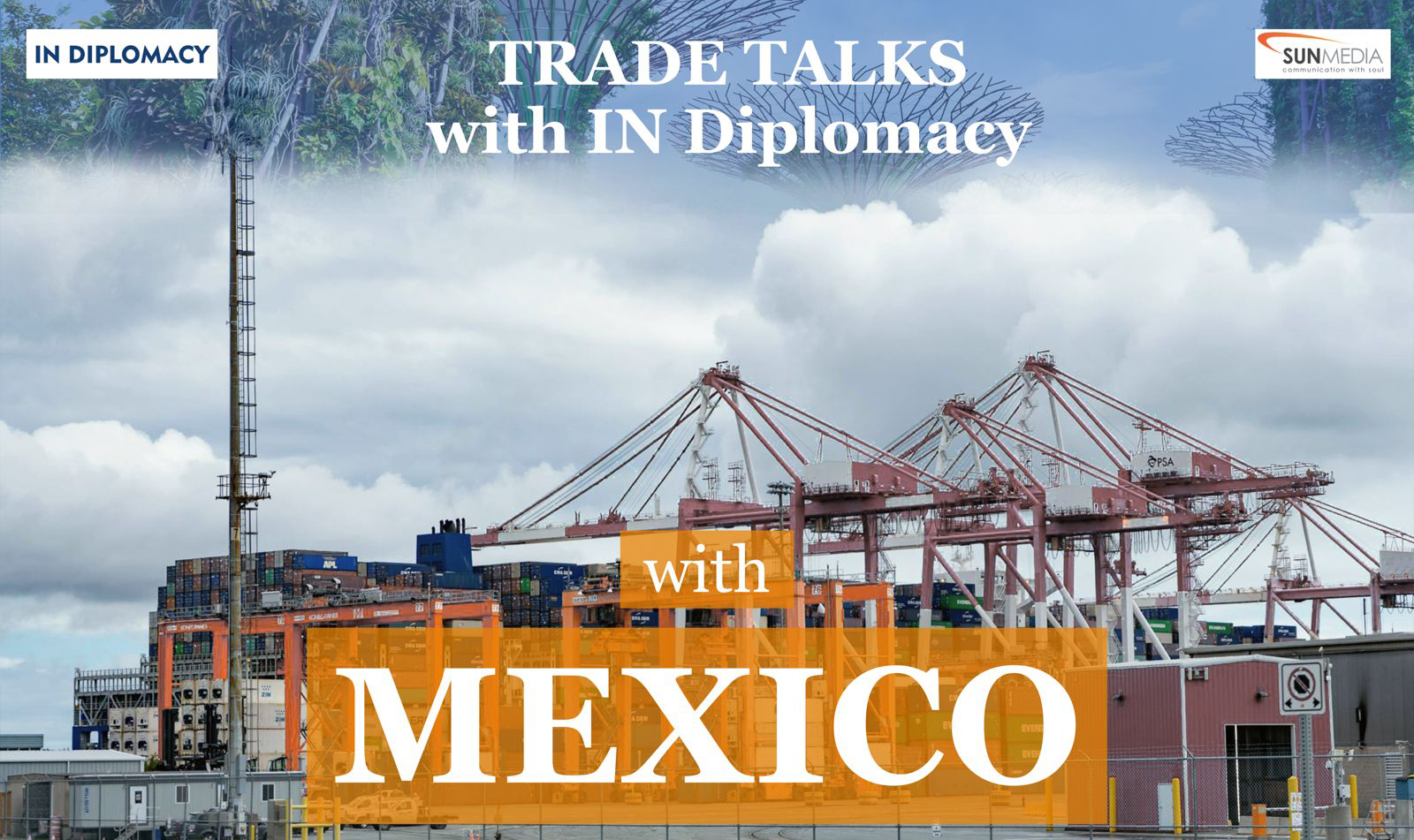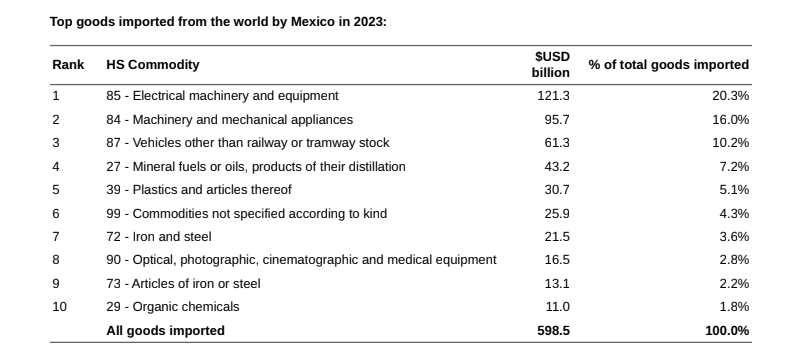
Exploring key opportunities, challenges, and partnerships between Mexico and Singapore to strengthen bilateral trade and investment.
Singapore, 17 April 2025 – The Trade Commission Office of the Embassy of Mexico recently held an exclusive Trade Talk with IN Diplomacy, shedding light on the ongoing efforts to bolster economic ties between Mexico and Singapore. The conversation covered various facets of the bilateral trade relationship, highlighting Mexico’s ease of doing business, infrastructure projects, and opportunities for foreign companies looking to enter the Mexican market.
Q: How does your country rank in terms of ease of doing business or trade?
Mexico has historically ranked in the upper half globally for ease of doing business. In the World Bank’s Doing Business 2020 report, Mexico ranked 60th out of 190 economies. It was the best-ranked country in Latin America. Mexico offers relatively straightforward procedures for starting a business, registering property, and trading across borders, although challenges remain in areas like enforcing contracts and dealing with construction permits.
Q: What steps can foreign companies take to better understand or adapt to your country’s regulatory environment?
Foreign companies should consider engaging local legal and accounting experts to navigate tax, labor, and business regulations. Mexico offers special frameworks for contract manufacturing and temporary imports that may be attractive to different operations. It is also advisable to consult with the Embassy of Mexico, the Singapore-Mexico Chamber of Commerce, and local government authorities or chambers of commerce for insights on investments and regulations. Each local government in Mexico has a dedicated agency for the economic promotion and attraction of Foreign Direct Investment, providing unique insights on the location of clusters, availability of services, and local talent. Additionally, attending industry-specific events or trade shows can help build contacts and learn from local peers, while partnering with a local distributor or representative who understands the regulatory nuances can ensure smoother operations.
Q: How can foreign companies participate in your country’s infrastructure, energy, or logistics projects?
Foreign companies can first seek the advice of the Embassy of Mexico and the Singapore Chamber of Commerce, as they have comprehensive access to available information on federal and local projects. It is also important to keep track of the official gazette (Diario Oficial de la Federación) for the publication of public tenders, and consult available tenders through Mexico’s national procurement platform, Compranet or Proyectos México (www.proyectosmexico.gob.mx). Companies may consider forming joint ventures or strategic alliances with local firms that have prior government contracts. Additionally, exploring opportunities in public-private partnerships (PPPs), especially in sectors such as renewable energy, ports, and transportation, can be a valuable approach for foreign companies.
Q: Can the embassy assist with market entry strategies, business matching, or B2B meetings?
Yes, the Embassy of Mexico in Singapore, along with the Singapore-Mexico Chamber of Commerce, can facilitate business matching and introductions, provide market insights and sector-specific information, and support participation in trade fairs and investment forums. Additionally, they can coordinate with local trade bodies such as the Mexican Business Council on Foreign Trade, Investment and Technology (COMCE) and local state promotion agencies to aid market entry.

Q: What are the currently traded goods or services between Singapore and your country?
Mexico and Singapore enjoy a growing bilateral trade relationship. In 2024, the total trade between the two nations reached SGD$ 11.57 billion, marking a significant 60.5% increase from the SGD$ 7.09 billion in 2023. Trade in services also saw substantial growth, amounting to SGD$4 billion in 2023. Investments between the two countries rose to SGD$ 1.54 billion (USD$ 1.13 billion) in the same year. Considering Singapore’s direct investment abroad, which reached USD$ 1,027 billion by the end of 2022, there is significant potential for further expansion in trade and investment between both nations and regions.
Key goods traded from Mexico to Singapore include automotive parts, electronics such as semiconductors, medical devices, popular beers like Corona, avocados, and processed foods. On the other hand, Singapore exports machinery, electronics, precision instruments, and petrochemical products to Mexico. Additionally, the trade between both countries is expanding, particularly in sectors such as logistics, fintech, and IT outsourcing.
Q: What kinds of products from your country are you actively looking to introduce into new markets?
Mexico is seeking to promote agri-food products such as avocados, berries, tequila, mezcal, coffee, and specialty chocolates, along with medical devices and pharmaceuticals. The country is also focusing on renewable energy technology and green manufacturing solutions, as well as creative industries like animation, digital media, and design services.
Q: Are there any products from Mexico that Singapore can import cost-effectively due to favorable trade terms or pricing advantages?
Yes, under the CPTPP (Comprehensive and Progressive Agreement for Trans-Pacific Partnership), both countries benefit from preferential tariff rates on a wide range of products. These include fresh and processed agri-products such as avocados and pork, alcoholic beverages like tequila and mezcal, as well as electronics and auto parts. Mexico’s cost-competitive manufacturing also makes OEM and component imports highly attractive for Singaporean businesses.
Q: What would be your advice to companies seeking partners or buyers in your country?
Foreign companies seeking to engage with Mexico should leverage bilateral and multilateral Free Trade Agreements (FTAs), as well as the support of key entities such as the Embassy of Mexico, the Singapore-Mexico Chamber of Commerce, Singapore Enterprise, and the Singapore Business Federation. These organisations offer programmes and represent the interests of Mexico and Latin America. Attending major trade shows like Expo ANTAD, the Mexico Business Summit, or Energy Mexico can provide valuable networking opportunities. Building strong personal relationships is crucial, as trust and long-term commitment are highly valued in Mexican business culture. Companies should also be prepared to navigate bureaucracy and ensure thorough legal due diligence. Finally, partnering with a local consultant or distributor who possesses in-depth market knowledge can help navigate the regulatory and business landscape effectively.
















